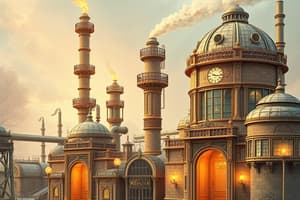Podcast
Questions and Answers
What is the primary use of kerosene?
What is the primary use of kerosene?
- Refinery fuel
- Motor fuel
- Diesel oil
- Fuel for planes (correct)
Methane is the most abundant component of natural gas.
Methane is the most abundant component of natural gas.
True (A)
What does the octane number measure?
What does the octane number measure?
The quality of petrol.
Natural gas is primarily composed of ______.
Natural gas is primarily composed of ______.
Match the following fractions of petroleum with their uses:
Match the following fractions of petroleum with their uses:
Flashcards
Natural Gas (C₁-C₄)
Natural Gas (C₁-C₄)
The smallest hydrocarbons, with 1 to 4 carbon atoms per molecule. They are found in natural gas and used as fuel and feedstock for other chemicals.
What is Natural Gas?
What is Natural Gas?
A mixture of hydrocarbons, primarily methane, found naturally underground. It is a valuable energy source used for heating, cooking, and electricity generation.
Octane Number
Octane Number
A measure of how resistant a petrol is to premature ignition (knocking). Higher octane numbers indicate better resistance to knocking.
Branched-Chain Hydrocarbons (e.g., iso-octane)
Branched-Chain Hydrocarbons (e.g., iso-octane)
Signup and view all the flashcards
Auto-ignition (Knocking)
Auto-ignition (Knocking)
Signup and view all the flashcards
Study Notes
Petroleum Fractions
- Petroleum is a mixture of hydrocarbons
- Crude oil is separated into fractions by fractional distillation
- Fractions are separated based on their boiling points
- Different fractions have different uses
Natural Gas
- Natural gas is a mixture of hydrocarbons, mainly methane
- It's also commonly found with ethane, propane, and butane
- Methane is the main component of natural gas in the North Sea
- In the USA, propane and butane are the prevalent components of natural gas.
- Mercaptans are added for safety to natural gas to detect leaks because natural gas is odorless
Petrol (Gasoline)
- Petrol is a fraction of crude oil used as a fuel for engines
- Petrol is a mixture of hydrocarbons
- The petrol fraction has a specific boiling range for effective use as a car fuel
- Auto-ignition ('knocking'):
- Too much pressure in the engine
- Explosion of the fuel-air mixture too soon
- This can damage the engine
- Petrol rich in straight chained hydrocarbons (e.g., hexane and octane) is more prone to knocking
- Branched chained hydrocarbons (e.g., 2,2,4-trimethylpentane [iso-octane]) burns more smoothly
Octane Number
- A measure of the anti-knocking properties of petrol
- Higher octane number, less prone to knocking
- Iso-octane (2,2,4-trimethylpentane) has an octane rating of 100
- Octane rating is used to compare different petrols
Studying That Suits You
Use AI to generate personalized quizzes and flashcards to suit your learning preferences.




